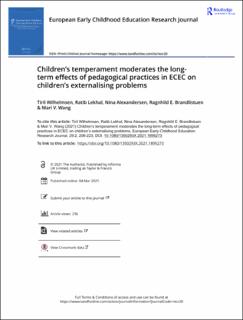Children’s temperament moderates the long-term effects of pedagogical practices in ECEC on children’s externalising problems
Peer reviewed, Journal article
Published version
Permanent lenke
https://hdl.handle.net/11250/3041034Utgivelsesdato
2021Metadata
Vis full innførselSamlinger
- Scientific articles [2181]
Originalversjon
European Early Childhood Education Research Journal. 2021, 29 (2), 206-223. 10.1080/1350293X.2021.1895273Sammendrag
In this study, we explored how free play and scaffolding practices in Early Childhood Education and Care (ECEC) related to children’sexternalising problems both in ECEC and later in school.Furthermore, we aimed to reduce the knowledge gap of whether these relations depended on children’s differences in emotional temperament. We used structural equation modelling to analysedata from 7421 children from the Norwegian Mother, Father an dChild Cohort Study. Results indicated that more free playassociated with less externalising problems in ECEC for children ingeneral. For children with higher emotionality, more free playrelated to increased externalising problems in school. Scaffoldingin ECEC was not associated with externalising problems, butmoderated the longitudinal association of free play for children with higher emotionality. All children benefited from free play in ECEC for their concurrent mental health. However, for childrenwith higher emotionality, more free play in ECEC might be a riskfactor for reduced mental health in school, where there is lessfree play than in ECEC. More scaffolding in combination with freeplay in ECEC can reduce this risk. Further research should addressthe content of play and scaffolding practices in more detail.
